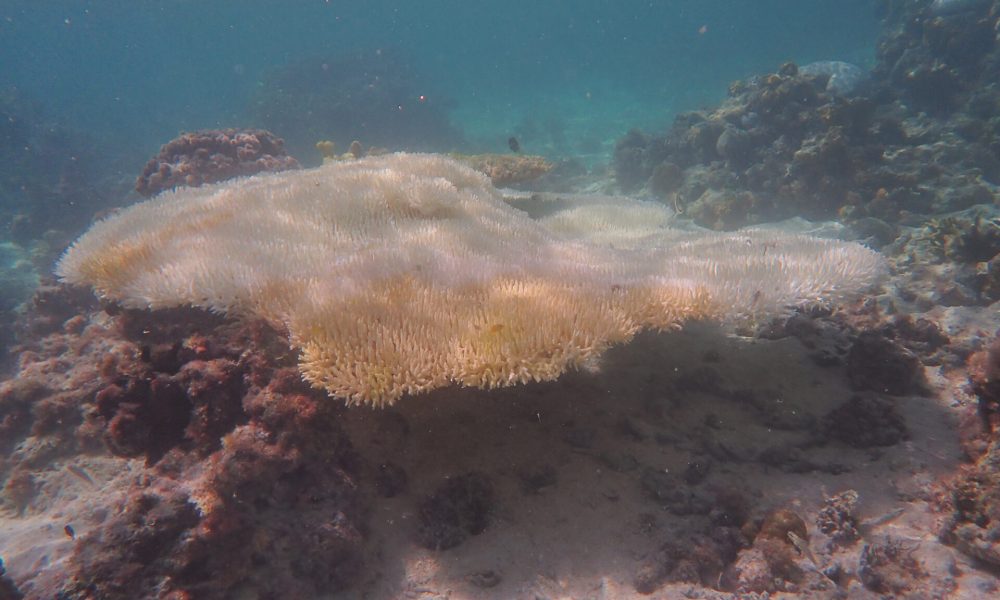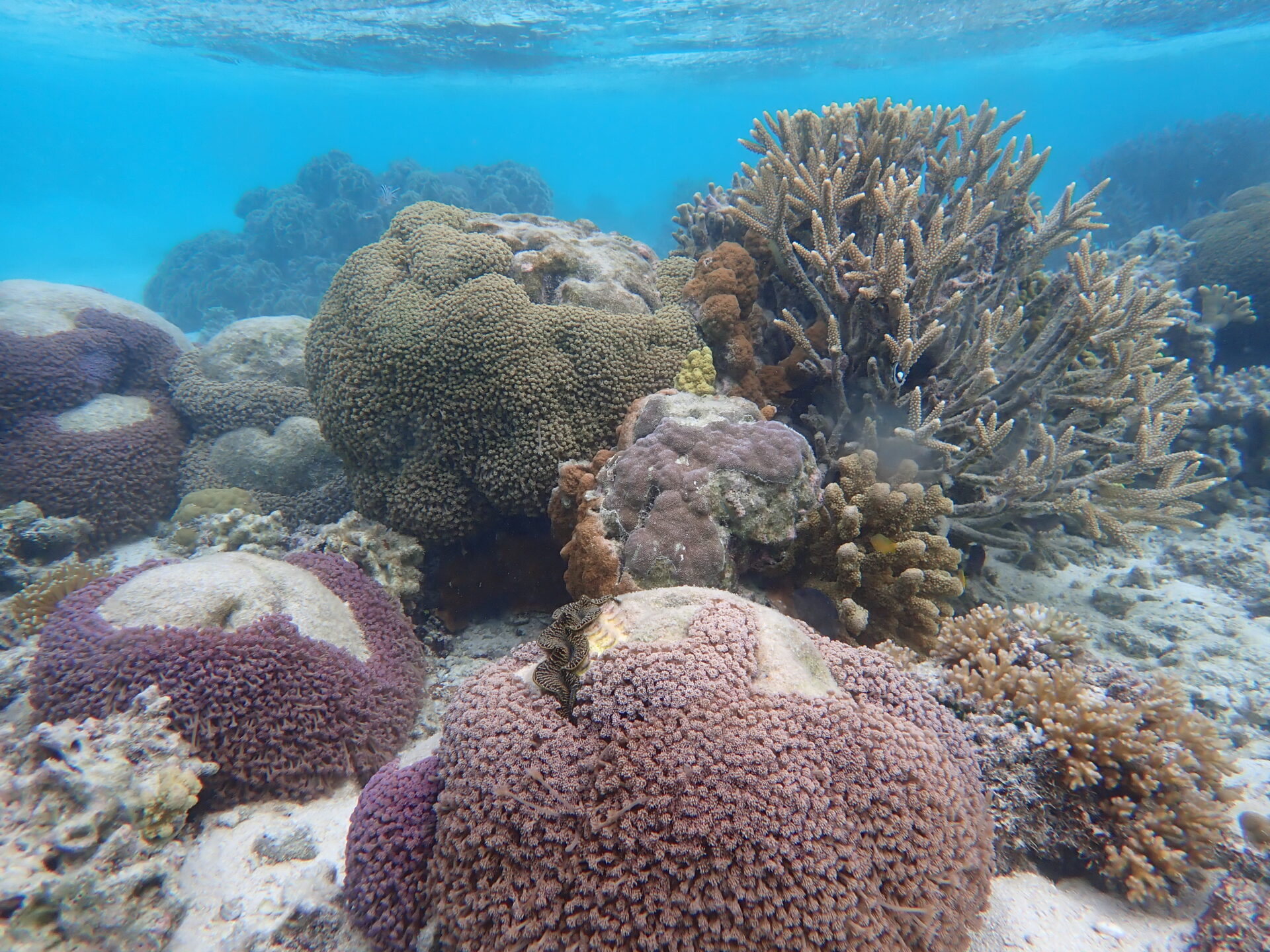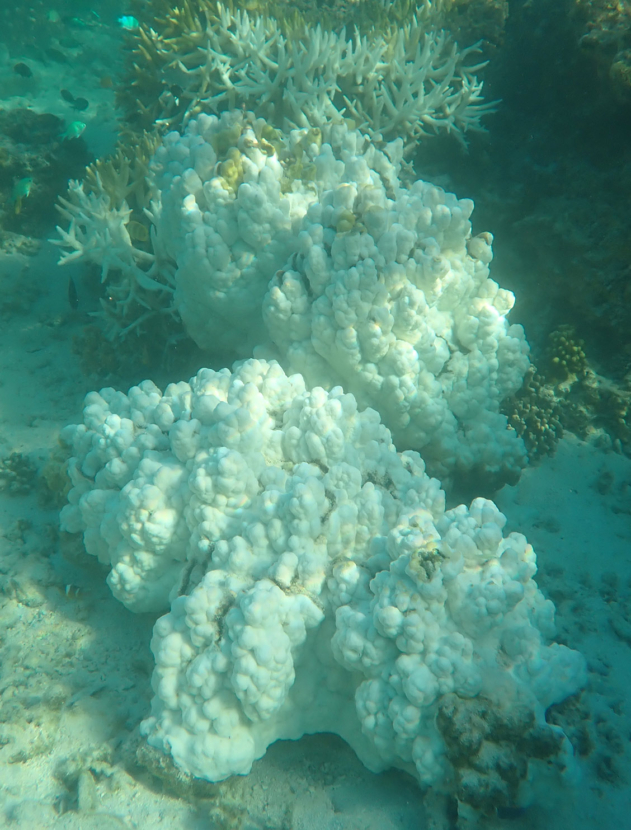Bleach, Please: Why This New Coral Reef Study Should Be A Wake Up Call

- Words by Peppermint
Word on the reef is in – and it’s grim. A peer-reviewed study (the first of its kind) by a team of marine scientists from The University of Sydney paints a stark picture of the state of the southern Great Barrier Reefs: In early 2024, marine heatwaves left coral colonies bleached at “catastrophic levels”.
IMAGES COURTESY OF THE UNIVERSITY OF SYDNEY / ABOVE: Bleached Acropora table coral, One Tree Island Reef, April 2024.

ABOVE: One Tree Island reef ‘gutter’ coral pre-bleaching – April 2022
Led by Professor Maria Byrne from the School of Life and Environmental Sciences, the research highlights the alarming impact of unprecedented marine heatwaves on coral ecosystems, raising urgent concerns for marine biodiversity and the communities that depend on these vital ecosystems.
The study, published in Limnology and Oceanography Letters, provides critical insights into the extent of coral bleaching and mortality during the 2023-2024 global marine heatwave. The research team meticulously tracked the health of 462 coral colonies at the University of Sydney’s Great Barrier Reef research station at One Tree Island over a period of 161 days.
The results revealed that 66% of the colonies were bleached by February 2024 and 80% by April. By July, 44% of the bleached colonies had died, with some coral experiencing a staggering 95% mortality rate.
Coral reefs aren’t just biodiversity hotspots, but also crucial for food security and coastal protection, says Professor Maria Byrne, lead author of the study. “Our findings underscore the urgent need for action to protect coral reefs. The southern Great Barrier Reef, despite its protected status, was not immune to the extreme heat stress that triggered this catastrophic bleaching event.”

ABOVE: Acropora and Porites bleached coral at One Tree Island Reef, April 24.
Professor Ana Vila Concejo, a co-author of the study from the School of Geosciences, said: “This research is a wake-up call for policymakers and conservationists. The resilience of coral reefs is being tested like never before, and we must prioritise strategies that enhance their ability to withstand climate change. Our findings underscore the need for immediate and effective management interventions to safeguard these ecosystems.”
This research is a wake-up call for policymakers and conservationists. The resilience of coral reefs is being tested like never before, and we must prioritise strategies that enhance their ability to withstand climate change.
The implications of this research extend beyond the ecology and conservation. Coral reefs provide essential services to human communities, including fisheries, tourism and coastal protection. As the Great Barrier Reef faces increasing threats from climate change, the study calls for a collaborative approach to conservation that involves local communities, scientists and policymakers.
Dr Shawna Foo, a Sydney Horizon Fellow and co-author of the study, said: “Seeing the impacts on a reef that has largely avoided mass bleaching until now is devastating. The high rates of mortality and disease, particularly in such a remote and pristine area, highlight the severity of the situation. Although the reef‘s highly protected status may not have prevented the impacts of the heatwave, its role in facilitating recovery will be crucial to observe.”

ABOVE L-R: Professor Ana Vila Concejo on the Great Barrier Reef, University of Sydney Horizon Fellow Dr Shawna Foo, and Professor Maria Byrne on the Great Barrier Reef.
But this isn’t a story of giving up – this is a rallying cry.
Yes, the situation is dire, but it’s also a reminder of why we can’t stop fighting for our reefs and the communities (both human and non-human) that depend on them. The reef has shown resilience before, and with our help, it can again. You can help by supporting groups like Reef Restoration Foundation, Great Barrier Reef Foundation, Tangaroa Blue Foundation, or Australian Marine Conservation Society. And as always, keep advocating for strong climate policies.
JOIN OUR MAILING LIST
Brighten up your inbox with our not-too-frequent emails featuring Peppermint-related news, events, competitions and more!
explore
More articles
Look, I don’t want to make anyone panic but IT’S DECEMBER!!! If you’re planning to give homemade gifts, you’re going to have to act fast. I’m a big believer that a DIY gift is the best gift of all, because…
Listen, we need to talk about December. Somewhere between the first appearance of gazillions of Mariah Carey memes prepping us for the imminent arrival of…
When you hang a painting on a wall, the story stays put. But when you wear a beautifully made garment that may as well be…
We all do it: fire up the car for a 5-minute drive to pick up groceries, drop off sewing supplies, or run a quick errand…
Hang out with us on Instagram
Sunday serving suggestion ☀️
Gorgeous photos from @JolieFemmeStore - who make sweet garments from vintage bedsheets.
#PeppermintMagazine #SlowSunday #SwitchOff #Unplug #ReadAMagazine

A toast to the old you 🥂
We wholeheartedly love this post from the brilliant @EmilyOnLife:
“2026: Reinvent, burn it down, let it go (whatever it is). Year of the Snake it up. Exercise your boundaries, exercise your body, take one teeny step every day towards a life that feels better to be in.
But don’t you dare shit on your old self while you do it.
Hold yourself with reverence and tenderness and respect, because you got you this far. You did your very best with the information and tools you had at the time. You scraped yourself together, you made it work, you survived what felt impossible to survive: again and again and again.
You are perpetually in the process of becoming, whether you can feel it or not, whether or not you add it to your 2026 to-do list.“

Some very wise words from @Damon.Gameau to take us into 2026 🙌🏼

⭐️ We made it!!! ⭐️
Happy New Year, friends. To those who smashed their goals and achieved their dreams, and to those who are crawling over the finish line hoping to never speak of this year again (and everyone else in between): we made it. However you got here is enough. Be proud.
It’s been a tough year for many of us in small business, so here’s to a better year in 2026. We’re forever grateful for all your support and are jumping for joy to still be here bringing you creativity, kindness and community.
We’re also excited to be leaping into the NY with our special release sewing pattern – the Waratah Wrap Dress!
How great are our fabulous models: @Melt.Stitches, @KatieMakesADress and @Tricky.Pockets - and also our incredible Sewing Manager @Laura_The_Maker! 🙌🏼
Ok 2026: let’s do this. 💪🏼
#PeppermintWaratahWrapDress #PeppermintPatterns #SewingPattern #MeMade #WrapDress #WrapDressPattern

Putting together our annual Stitch Up brings on all the feels! We feel humbled that you’ve chosen to sew Peppermint patterns, we feel inspired by the versions you’ve created and we feel proud of you.
Where to begin?! As always, there has been a plethora of Peppermint patterns flooding our feeds this year, and we wish we could showcase more than just a handful of magnificent makes from you, our clever community. We encourage you to flip through the me-made items in your wardrobe or scroll through your grid and remind yourself of the beauty you’ve created with your own two hands (and maybe a seam ripper and some choice words). Congratulations to all of us for our creative achievements this year!
We’ve put together some (but absolutely not all) of our favourites from 2025 over on our website. We hope it inspires your next make!
🪡 Link in bio 🪡
Pictured: @FrocksAndFrouFrou @MazzlesMakes @KatieMakesADress @_Marueli_ @IUsedToBeACurtain @Nanalevine.Couture @PiperInFullColour @MadeByMeJessieB @SarahMalkawi @Made.By.Little.Mama
#PeppermintPatterns #SewingPatterns #MeMade #MeMadeEveryday

“The ocean is a great equaliser. It doesn’t matter your age, size, background or circumstances – when you’re in the water, you’re stripped back to your essence. I’ve watched women who were terrified of the ocean walk in tentatively, then emerge with tears of joy and new-found confidence.”
For Perth photographer Amanda Battle, the deep blue has brought sisterhood and second chances. Growing up in Shoalwater Marine Park, the ocean was both her playground and sanctuary, and a balm for body and soul during challenging times. Born from her own healing journey, Amanda’s @WomenOfWaterProject, book and documentary showcases a community of women who found belonging and connection in shared experiences in the ocean.
“Every single woman arrived with her own story – grief, trauma, joy, resilience – and every single woman showed up exactly as they were in that moment. Photographing over 100 women in the ocean for the Women of Water book has been the most humbling privilege of my life.”
Discover Amanda’s work and story in ‘Saltwater salve’ in issue 64, at newsagents and stockists now!
#PeppermintMagazine #WomenOfWater #OceanTherapy #DeepBlue #OceanPhotography

















